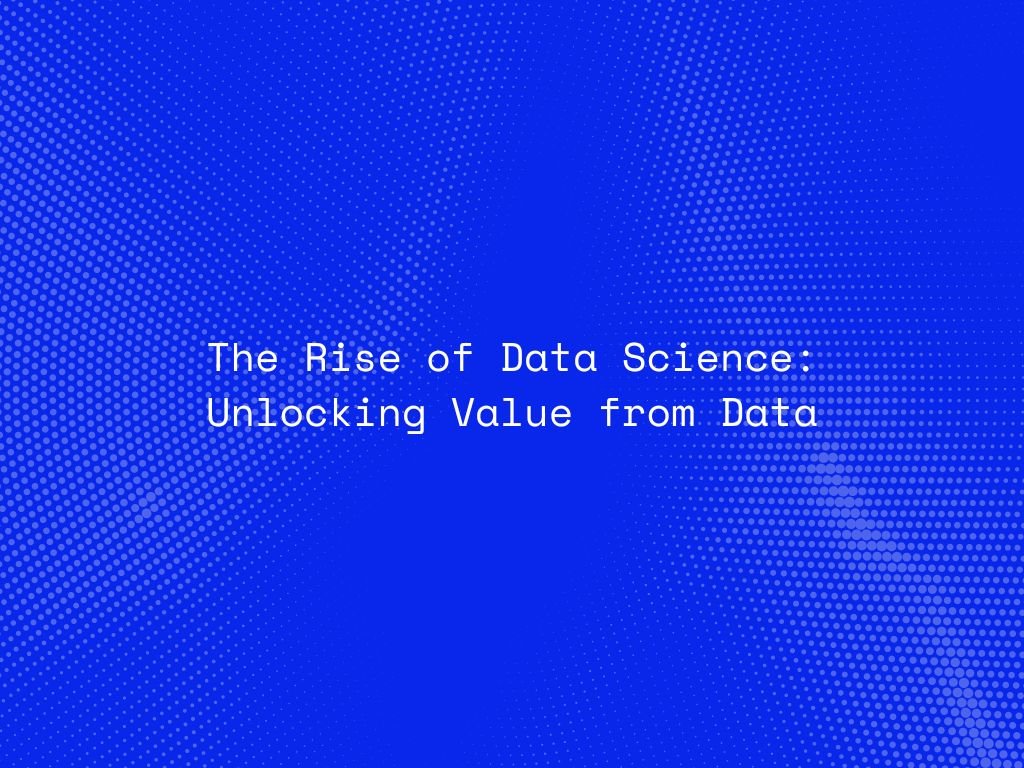In the era of big data, Data Science has emerged as a transformative force across industries. By leveraging vast amounts of data, businesses can uncover valuable insights, make informed decisions, and drive innovation. This blog explores the rise of data science, its impact on various sectors, and how organizations can unlock value from data to gain a competitive edge.
What is Data Science?
Data Science is an interdisciplinary field that combines statistical analysis, machine learning, and domain expertise to extract meaningful insights from structured and unstructured data. It involves various processes, including data collection, cleaning, analysis, visualization, and interpretation. The ultimate goal of data science is to turn raw data into actionable knowledge.
The Evolution of Data Science
The journey of data science began with the advent of computers and the ability to store and process large datasets. Over time, advances in technology, such as increased computational power and the development of sophisticated algorithms, have significantly expanded the capabilities of data science. Today, the proliferation of the internet, IoT devices, and social media has led to an explosion of data, further fueling the need for data science.
Key Components of Data Science
Data Science encompasses several key components that work together to unlock value from data:
- Data Collection: Gathering data from various sources, such as databases, APIs, sensors, and web scraping.
- Data Cleaning: Preprocessing data to remove errors, inconsistencies, and missing values.
- Data Analysis: Applying statistical techniques to explore and understand data patterns and relationships.
- Machine Learning: Using algorithms to build predictive models and identify trends.
- Data Visualization: Creating visual representations of data to communicate insights effectively.
- Interpretation: Drawing actionable conclusions and making data-driven decis
Impact of Data Science Across Industries
The rise of Data Science has had a profound impact on various sectors, revolutionizing the way organizations operate and compete:
1. Healthcare
In healthcare, data science is enhancing patient care, improving diagnosis accuracy, and optimizing treatment plans. By analyzing medical records and genomic data, data scientists can identify disease patterns, predict outbreaks, and personalize treatments.
2. Finance
The finance industry uses data science for risk assessment, fraud detection, and algorithmic trading. Predictive models analyze market trends and financial data to make investment decisions, while anomaly detection algorithms help identify fraudulent activities.
3. Retail
Retailers leverage data science to understand customer behavior, optimize inventory, and personalize marketing campaigns. By analyzing sales data and customer interactions, businesses can predict demand, recommend products, and improve customer satisfaction.
4. Manufacturing
In manufacturing, data science is used to enhance production efficiency, predict equipment failures, and optimize supply chains. IoT sensors collect real-time data from machines, allowing predictive maintenance and minimizing downtime.
5. Marketing
Data science empowers marketers to create targeted campaigns, analyze consumer sentiment, and measure campaign effectiveness. Social media analytics and customer segmentation enable personalized marketing strategies, driving higher engagement and conversion rates.
Connect With Us
Unlocking Value from Data
To unlock the full potential of Data Science, organizations must adopt a strategic approach:
1. Invest in Data Infrastructure
Building a robust data infrastructure is crucial for effective data management. This includes data storage solutions, data integration tools, and scalable cloud platforms that can handle large volumes of data.
2. Foster a Data-Driven Culture
Creating a data-driven culture involves promoting the use of data in decision-making processes across all levels of the organization. Training employees in data literacy and encouraging collaboration between data scientists and business teams are essential steps.
3. Embrace Advanced Analytics
Implementing advanced analytics techniques, such as machine learning and AI, allows organizations to uncover deeper insights and automate decision-making processes. Continuous experimentation and model refinement are key to staying ahead of the competition.
4. Focus on Data Quality
Ensuring data quality is fundamental to the success of data science initiatives. Implementing data governance practices and regular data audits can help maintain accuracy, consistency, and reliability of data.
5. Visualize and Communicate Insights
Effective data visualization and communication are critical for translating complex data insights into actionable strategies. Using intuitive dashboards and visual tools can help stakeholders understand and act on data-driven recommendations.
The Future of Data Science
The future of Data Science is promising, with advancements in technologies such as quantum computing, edge computing, and AI driving new possibilities. As data continues to grow exponentially, the ability to harness its value will become increasingly vital for businesses and societies.
Key trends to watch include:
- Automated Machine Learning (AutoML): Simplifying model building and deployment for non-experts.
- Explainable AI (XAI): Enhancing transparency and trust in AI-driven decisions.
- Edge Analytics: Processing data at the source for real-time insights.
- Data Privacy and Ethics: Ensuring responsible data use and compliance with regulations.
Conclusion
The rise of Data Science is unlocking unprecedented value from data, transforming industries, and driving innovation. By investing in data infrastructure, fostering a data-driven culture, embracing advanced analytics, and focusing on data quality, organizations can harness the power of data to gain a competitive edge. As technology continues to evolve, the potential for data science to shape the future is limitless, making it an indispensable tool for success in the digital age.




